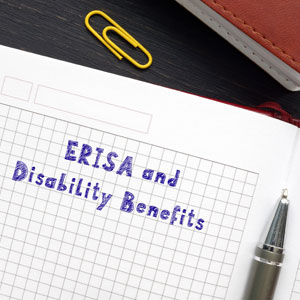
In this article, you can discover…
The language used in an employer’s insurance disability policy is everything. It governs your responsibilities and the responsibilities of your employer.
Policy language also describes what you must do to receive benefits and what the insurance company must do once you satisfy their obligation. It covers how long the insurance company must pay benefits and if there are any limitations to the benefits that they pay.
All of these details make understanding the wording of your employer’s policy extremely important to a successful Employee Retirement Income Security Act (ERISA) claim.
Mental health limitations and self-reported symptom limitations are often seen in disability insurance policies. The majority of these policies will limit payment of benefits for these kinds of conditions for 24 months for the life of the claim, even if you’re still suffering from these conditions after the 24th month.
If your claim has been denied, request and obtain a copy of your claim file from the insurance company. Request and get ahold of the disability insurance policy, as well, and immediately consult with an ERISA lawyer.
Take these steps before you file an appeal. This allows your attorney to review your case and add more evidence or documents to your file. After an appeal is filed, there’s little that can be done, so it’s important for you to take these steps and seek legal counsel before you file.
If your appeal is denied, you have the legal right to sue for benefits, and the evidence entered in your appeal is the evidence we’ll use in court. As a result, it’s crucial for your appeal to be thorough and accurate in the information it includes.
Florida courts will first look to see if the insurance company’s interpretation of their own documents is reasonable. If the court rules that the interpretation is reasonable, the court will side with the insurance company.
However, there is a standard of review in Florida, and if an insurance company is found to be in violation of that standard, ambiguous language in a policy could be found to be in your favor as a client.
This is especially true if the employer did not give the insurance company discretion to make the decision that they did when they denied your claim. In this case, a “de novo review” can be held.
This review allows the court to take a fresh look at the background of the insurance company’s decisions to determine if they were within the scope of the law.
In insurance policies, things are not always as they seem. For example, “pre-existing condition” can have different and specific meanings from one policy to the next. Some policies define a condition as pre-existing if a reasonable person would have sought and received treatment for it. Others define “pre-existing” as a condition for which you received diagnostic testing or took prescription medications.
Understanding if your condition and the way you approached your condition meets your policy’s standards of “pre-existing” is crucial. An attorney can deep dive into the legal language used in your policy and your medical records to determine if a carrier interpreted your treatment correctly.
This is not the kind of deft and nuanced argument that a layperson or a non-ERISA attorney would be skilled in. Reaching out to an ERISA attorney to understand your policy is crucial to navigating your claim and winning the benefits that you’re entitled to.
For more information on How Policy Language Shapes Your ERISA Claim, an initial consultation is your next best step. Get the information and legal answers you are seeking by calling (352) 577-7746 today.